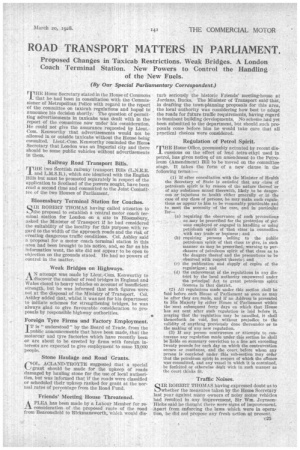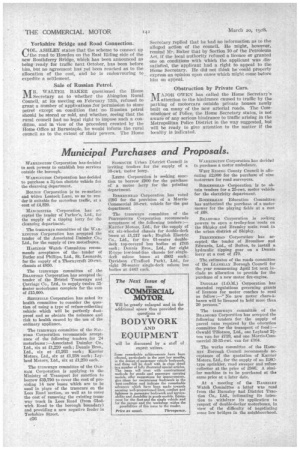ROAD TRANSPORT MATTERS IN PARLIAMENT.
Page 47

Page 48

If you've noticed an error in this article please click here to report it so we can fix it.
Proposed Changes in Taxicab Restrictions. Weak Bridges. A London Coach Terminal Station. New Powers to Control the• Handling of the New Fuels.
(By Our Special Parliamentary Correspondent.) THE Home Secretary stated in the House of Commons that he had been in consultation with the Commissioner of Metropolitan Police with regard to the report of the committee on taxicab regulations and hoped to announce his decision shortly: The question of permitting advertisements in taxicabs was dealt with in the report of the committee now under his consideration. He could not give the assurance requested by Lieut.Cora. Kenworthy that advertisements would not be allowed in or outside taxicabs without the House being consulted. Lieut.-Com. Kenworthy reminded the Home Secretary that London was an Iroperial city and there should be some public vehicles without advertisements in them.
Railway Road Transport Bills.
THE two Scottish railway transport Bills (L.N.E.R. and L.M.S.R.), which are identical with the English Bills but must be promoted separately in respect of the application to Scotland of the powers sought, have been read a second time and committed to the Joint Committee of the two Houses of Parliament. • Bloomsbury Terminal Station for Coaches.
SIR ROBERT THOMAS having called attention to the proposal to establish a central motor coach terminal station for London on a site in Bloomsbury, asked the Minister of Transport if he bad considered the suitability of the locality for this purpose with regard to the width of the approach roads and the risk of creating dangerous traffic conditions. Col. Ashley said a proposal for a motor coach terminal station in this area had been brought to his notice, and, so far as his information went, the site did not appear to be open to objection on the grounds stated. He had no powers of
control in the matter. •
Weak Bridges on Highways.
• N attempt was made by Lieut.-Cora. Kenworthy to fldiscover the number of road bridges in England and Wales closed to heavy vehicles on account of insufficient strength, but he was informed that such figures were not at the disposal of the Ministry of Transport. Col. Ashley added that, whilst it was not for his department to initiate schemes for strengthening bridges, he was always •glad to give favourable • consideration to proposals by responsible highway authorities.
Foreign Tyre Firms and Factory Employment.
JT is " understood " bythe Board of Trade, from the public announcements that have been made, that the motorcar and tyre factories which have recently been or are about to be erected by firms with foreign interests are expected to give employment to some 13,000 people.
Stone Haulage and Road Grants.
(-VOL. ACLAND-TROYTE suggested that a special
grant should be made for the upkeep of roads damaged by hauling stone for the use of local authorities, but was informed that if the road § were classified or scheduled their upkeep ranked for grant at the normal rates of percentage from the Road Fund.
Friends' Meeting House Threatened.
A PLEA has been made by a Labour Member for reIi consideration of the proposed route of the road from Beaconsfield to Rickmansworth, 'which would dis turb seriously the historic Friends' meeting-house at Jordans, Bucks. The Minister of Transport said that, in drafting the town-planning proposals for this area, the local authority was considering how best to adapt the roads for future traffic requirements, having regard to imminent building developments. No scheme had yet been submitted to the department, but should such proposals come before him he would take care that all practical choices were considered.
Regulation of Petrol Spirit.
MHE Home Office, presumably actuated by recent dis cussions on the effect of lead tetra-ethyl used in petrol, has given notice of an amendment to the Petroleum (Amendment) Bill to be 'moved on the committee stage. It takes the form of a new clause in the following terms:—
(1) If after consultation with the Minister of Health the Secretary of State is satisfied that any class of petroleum spirit is by reason of the nature thereof or a any substance mixed therewith, likely to be dangerous or injurious to health either generally or in the ease of any class of persons, he may make such regulations as appear to him to he reasonably practicable and to meet the necessity of the case, and in particular for— (a) requiring the observance of such precautions as nuty be prescribed for the protection of Per • sons employed or engaged-in handling or using petroleum spirit of that class in connection with any trade or business; and
requiring persons 'selling to the public petroleum spirit of that class to give, in such manner as may be prescribed, warning to purchasers of petroleum spirit of that class as to the dangers thereof and the precautions to be observed with respect thereto; and , the publication and Supply of copies of the regulations; and the enforcement of the regulations in any district by the local authority empowered under the principal Act to grant petroleum spirit licences in that district.
2) All regulations made under this section shall be laid before each House of Parliament as soon as may be after they are made, and if an Address is presented to His Majecty by either House of Parliament within the next subsequent forty days on which that House has sat next after such regulation is laid before it,
• praying that the regulation may be annulled, it shall thenceforth be void, but without prejudice to the validity of anything previously done thereunder or to the making of any new regulation.
(3) If any person contravenes or attempts to contravene any regulation made under this section he shall be liable on summary conviction to a fine not exceeding twenty pounds for each day on which the contravention occurs or continues, and the court before whom any person is convicted under this sub-section may order that the petroleum spirit in respect of which the offence was committed, and any vessel in which it is contained, be forfeited or otherwise dealt with in such manner as the court thinks fit.
(b)
(e) (d)
Traffic Noises.
IR ROBERT THOMAS having expressed doubt as to !Ow/healer the measures taken by the Home Secretary last year against many owners of noisy motor vehicles had resulted in any improvement, Sir Wm. JoynsonHicks said he thought there were signs of improvement. Apart _from enforcing the laws which were in operation, he did not propose any fresh action at Present. Yorkshire Bridge and Road Connection.
COL. ASHLEY states that the scheme to connect up the road to Howden on the East Riding side of the new Boothferry Bridge, which has been announced as being readyfor traffic next October, has been before him, but no agreement has yet been reached as to the allocation of the cost, and he is endeavouring to expedite a settlement.
Sale of Russian Petrol.
Apt. WALTER BAKER questioned the Home _A...Secretary as to whether the Abingdon Rural Council, at its meeting on February 13th, refused to grant a number of applications .for permission to store Petrol except on condition that no Russian petrol should be stored or sold, and whether, seeing that the rural council had no legal right to impose such a condition, and in view of the precedent created by the Home Office at Barnstaple, he would inform the rural council as to the extent of their powers. The T-Totne Secretary replied that he_had no information as to the alleged action of the council. He Might, however, remind Mr. Baker that by Section 10 of the Petroleum Act, if the local authority refused a licence or granted one on conditions with which the applicant was .dissatisfied, the applicant had a right to appeal to the Home Secretary. He did not think he could properly express an opinion upon cases which might come before him on appeal.
Obstruction by Private Cars. • IVIAJOR OWEN has called the Home Secretary's IV-II-attention to the hindrance caused to traffic by the parking of motorcars outside private houses newly built on many of the new arterial roads. The Commissioner of Police, the Home Secretary states, is not aware of any serious hindrance to traffic arising in the Metropolitan Police District in the way suggested, but will be ready to give attention to the matter if the locality is indicated.












































































































